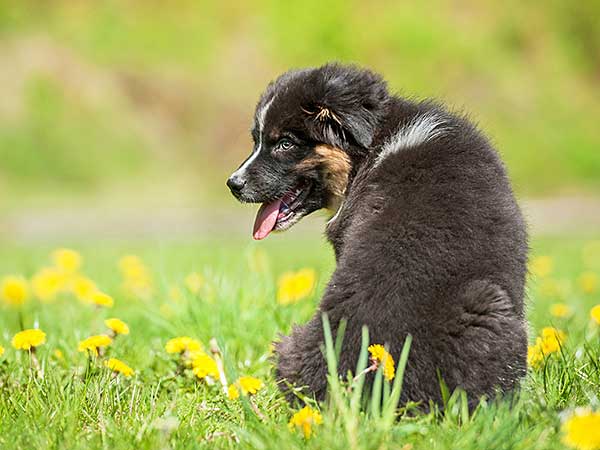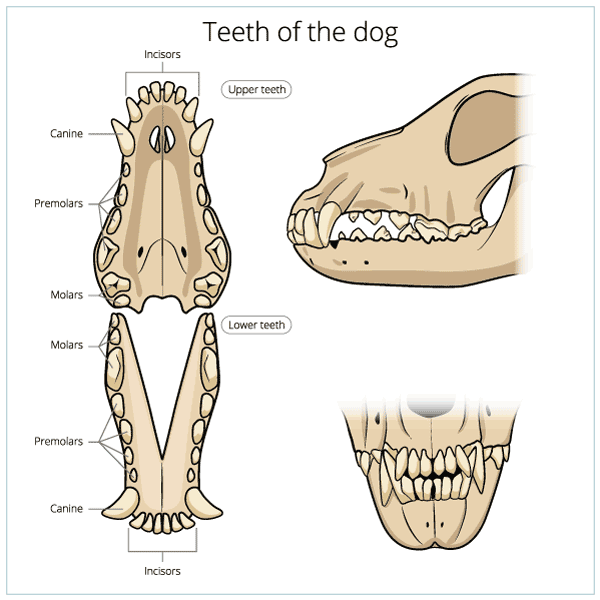
Everything You Need To Know About Puppy Teeth
Puppy teeth are quite similar to human "baby teeth." Just like us, our dogs will have more than one set of teeth in a lifetime, with the first set falling out naturally to make room for the adult or permanent teeth. For puppies this will occur within the first 7 or 8 months of their life. Of course having a dog that's teething can present some challenges for anxious owners, but here's all you need to know on the subject.
First off, puppies aren't born with teeth. Like their human counterparts, they are born toothless and their first teeth begin to erupt around two weeks of age. Over the next few weeks they'll continue to accumulate teeth until they've got their full puppy set of 28. Eventually these teeth will give way to their permanent teeth, which for most breeds, including the Australian Shepherd, will number 42.
Anyone who has ever had a baby or a puppy will know that growing all those teeth can sometimes be an uncomfortable process. Your dog will probably do a lot of chewing as he begins to get used to his puppy teeth, which can be rough on furniture, cabinets and anything else a pup can fit in his mouth. But you can rest easy because chances are it doesn't actually hurt the pup himself.

Grigorita Ko / stock.adobe.com
While many owners become anxious about their pup being in pain, that is usually not the case. As long as your dog is doing all of the routine things a dog does like eating, chewing, and exploring then he should be just fine. You only need to be concerned if he shows signs of being unable to do any of these or experiencing discomfort when he tries. In that case, you may want to take him to the vet for an exam.
At about 4 months old, the first puppy teeth will begin to fall out. This will generally happen of its own accord and you won't have to do anything to help the process along. In fact, it's better for your pup if you don't try to pull loose teeth as that can do more harm than good. In the rare case that there is a problem, once again it's best to let the vet take care of it.
When Do Dogs Lose Their Puppy Teeth?
The first set of teeth will come out in stages and be replaced by permanent teeth with the whole process being completed by the time the dog is 7 or 8 months old. During the teething phase you can help your pup adjust by giving him toys and treats that help the process along. You want to use toys that are soft and flexible, with plenty of give and treats that are designed specifically to promote good dental health.
Once those puppy teeth start coming in you can also begin getting your dog used to the idea of dental care, which will be important throughout his life. Use a gentle brush with warm water or toothpaste made especially for dogs. Since dogs don't know to spit, they'll swallow the paste and human toothpaste can be harmful to them if swallowed so you should never use it.
The most important thing to remember once your pup starts getting his teeth is not to panic. This is a perfectly natural process that shouldn't hurt him and will be over in a relatively short amount of time so there's nothing to worry about. Just try to be patient and you'll both get through it nice and easy!

Alexander Pokusay / stock.adobe.com
Have Dog Training Questions?
Check out these introductory dog training videos...
I want my dog to stop being aggressive.
I want some help training my new puppy.
I want my dog to stop barking at everything.
Get Australian Shepherd Info, Website Updates, Special Offers, and Cartoons...
FREE GIFT
You'll also receive a free copy of the ebook
My Everyday Dog Training Tools
by professional dog trainer Daniel Abdelnoor, "Doggy Dan"











 Loading Image...
Loading Image...